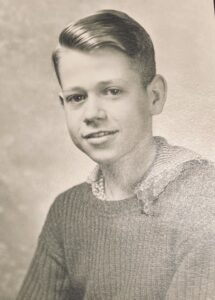Chapter 4
My brother, Bob, and I had a childhood of adventure. We were close to nature; quite poor but blessed with the freedom to explore. When I got to be older, I started working summer jobs.
I worked as a soda jerk in Judge Corbin’s drug store. It was a lot of fun and, of course, it gave me opportunities to flirt with the girls. I’d always give them some extra whipped cream.
One summer I lived with my Aunt Ruby and her husband near Lake Salubria. My brother leant me his car. I worked at The Corning Glass Works polishing television tubes. It was long before most families had a TV but Corning made the picture tubes. In my free time I swam at the lake and had the good fortune to be admired by the girls. I had a job. I had a car. The girls liked me. It was fun.
Another summer I worked at the Franklin Hotel in Romulus that had a restaurant with a dance band. There was a sign outside that said “Eddie Murphy and His Orchestra”. My boss was Eddie Murphy and I was the orchestra. That is, until the players came from the nearby Sampson Naval Base. These were heavy hitters from major big bands like Artie Shaw and Duke Ellington. Every time we played they’d show me new jazz licks.
A musician named Murray Godfrey taught me the importance of “accents”. When you accent a note, playing it a bit louder than the rest of the phrase, it gives your playing definition and creates emotion. The accents, the jazz riffs, and the new tunes they introduced me to, constituted the best education I could’ve asked for. I enjoyed that summer immensely and it didn’t hurt that there was a girl I liked there, too.
🔹 Transposition: A clarinet player has to transpose songs from the original key up one whole step. When the guys called out “‘In The Mood’ in Bb!”, I’d have to think quick and play it in C.
Back at home I’d play the clarinet all night long, then go for a long walk in the dawn hours. My mother allowed this. My father never said a word about it. The only person who ever complained was a neighbor with whom we shared a wall. And even he waited till the day we moved saying “I never wanna hear another gaddamm clarinet again!!”
My playing was all “by ear”. It didn’t bother me until I had a new teacher after Mrs. Dill left. She said I’d never amount to anything because I couldn’t read music. There are many fabulous musicians in the world who can’t read music. After all, music notation is a man made invention, whereas playing by ear is a true organic talent that should never be put down. But it bothered me. Maybe I set out to prove her wrong. I’d go on to earn my PhD in Music Education. So in a way I owe her some thanks.
